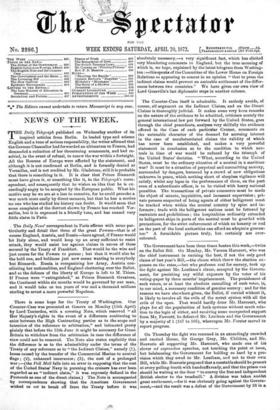The Government have been three times beaten this week,—twice on
the Ballot Bill. On Monday, Mr. Vernon Harcourt, who was the chief instrument in excising the best, if not the only good clause of last year's Bill,—the clause which threw the election ex- penses on the rates,—but who professes zeal for secrecy, took up the fight against Mr. Leatham's clause, accepted by the Govern- ment, for punishing any wilful exposure by the voter of his voting-paper by three months' imprisonment. The punishment of such voters, or at least the absolute cancelling of such votes, is, to our mind, a necessary condition of genuine secrecy ; and for the reasons we have elsewhere given, the Ballot, if carried without it, is likely to involve all the evils of the secret system with all the evils of the open. That would hardly deter Mr. Harcourt, who plays for all the popularities of both systems without much rela- tion to the logic of either, and receiving some unexpected support from Mr. Fawcett', he defeated Mr. Leatham and the Government by a majority of 1 (167 to 166), whereupon Mr. Forster moved to report progress.


































